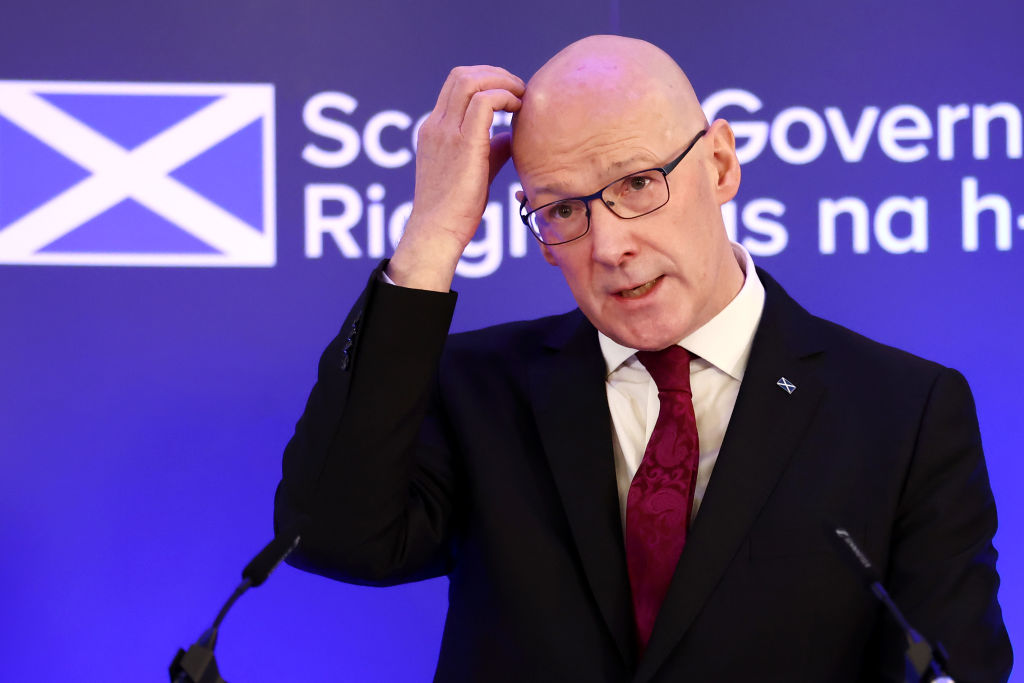It may seem peculiar that the Scottish Government sends money to Darfur or Malawi, as recently highlighted by Tories north of the border, when it has its own intractable social problems at home. We are forever hearing that a quarter of Scottish children are in poverty. Earlier this year, the SNP government declared a homelessness “emergency”. Is John Swinney not behaving like a ragged-trousered philanthropist, to quote Robert Tressell’s famous novel?
One reason is of course political vanity: the SNP always wants to play at being an independent nation even though it isn’t — especially in Europe where it has long had its own quasi-diplomatic presence in Brussels. The Scottish Government was rebuked last year by the Foreign Office for using devolved resources to promote the cause of independence abroad. The SNP has opened a number of foreign missions in locations including Washington, Paris, and Berlin — duplicating the UK’s own diplomatic infrastructure — on which it plans to spend a reported £27 million next year. Foreign affairs are a reserved matter under Schedule 5 of the Scotland Act 1998, and therefore the sole responsibility of the UK Government and UK Parliament.
But humanitarian activities are not generally regarded as being in breach of the Scottish Parliament’s devolved powers. Under a previous Labour administration led by Jack McConnell, the Scottish Executive, as it then was, built a relationship with the African state of Malawi to honour the memory of Scotland’s great missionary explorer David Livingstone, who devoted much of his earnings to combatting slavery in the 19th century. This would count as a legitimate purpose for modest Government expenditure.
Less easy to justify was Nicola Sturgeon’s virtue-signalling award of “reparations” to the Global South after COP 26 in Glasgow in 2021, to “mitigate the impact of climate change”. The UK Government does not support the idea of reparations, as Rishi Sunak made clear at COP27, and regarded Sturgeon’s action as a transparently political stunt intended to embarrass Britain. The sum involved — £5 million — was ultimately nugatory, and it is still not clear that it has actually been donated. A freedom of information request established that it had not been actioned by July 2023. Meanwhile, developing countries affected by global warming are seeking a “loss and damage” payment of over £500 billion.
The UK Government is more relaxed about modest donations to charities such as the £375,000 given to three NGOs in Darfur. It is a sum that would anyway be lost as a rounding error in the £61-billion Scottish Budget.
Scotland has been a nation in its own right since 1707, and it is not unreasonable for a national government to make humanitarian gestures. It is entirely proper for the Government to promote Scotland’s “brand” abroad, provided this does not involve conniving to undermine the Union. Scottish first ministers probably spend almost as much attending Tartan Day celebrations in America. No one is complaining about that, or the trade promotions which come with it.
What’s more, the UK Government must tread carefully in highlighting Scotland’s foreign aid, lest questions be raised about its own expenditure of over £11 billion. It is hard to justify this level of spending on developing nations — including, bizarrely, China — when the Government says it cannot find £1.5billion to keep paying the winter fuel allowance to all pensioners. More contentious still is Energy Secretary Ed Miliband’s promise to spend £11.6 billion in overseas climate aid.
All foreign aid is, to some extent, a vanity exercise for a country which is unable to meet its own bills, as Nigel Farage’s Reform UK has argued. It is in a sense a distant legacy of imperial noblesse oblige, and the UK is no longer a world-leading economy. So we won’t be hearing too much criticism from Labour of Swinney’s generosity, in case it backfires in Westminster. Starmer will struggle to avoid the argument that if any aid is being handed out, it should go first of all to British citizens.











Join the discussion
Join like minded readers that support our journalism by becoming a paid subscriber
To join the discussion in the comments, become a paid subscriber.
Join like minded readers that support our journalism, read unlimited articles and enjoy other subscriber-only benefits.
Subscribe